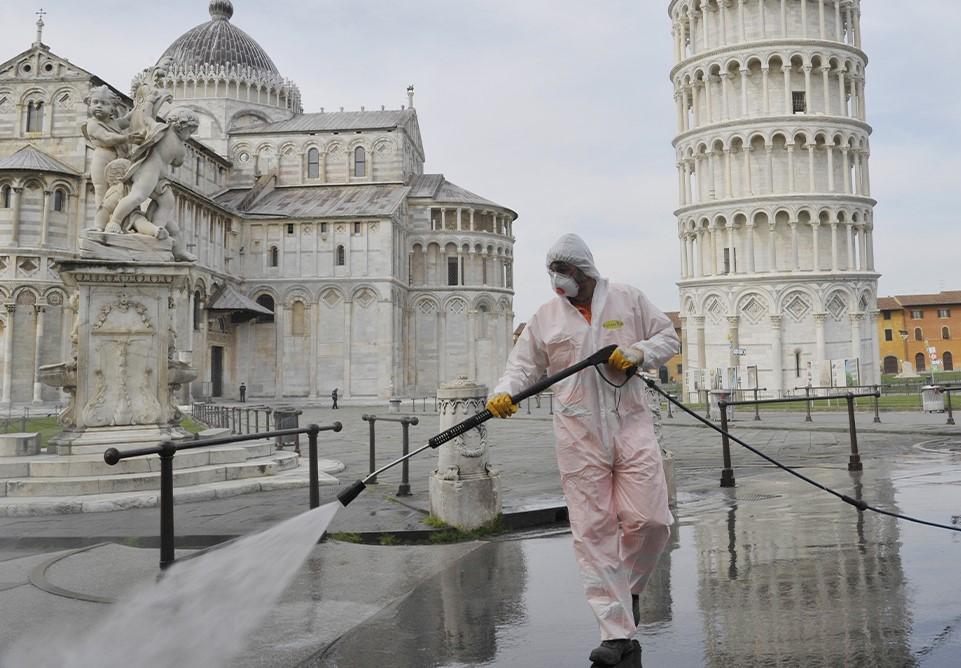Many a journalist and intellectual has recently ventured to describe, often in great detail, the scenario we’ll be faced with after the pandemic. Inevitably, these analyses are subject to two kinds of limitations. First: the scale of this crisis doesn’t allow the necessary distance one would need in order to reasonably imagine the outcomes. Second, and more importantly, such outcomes depend largely upon the critical understanding of the situation that we are capable, collectively, of formulating. This is what should keep us busy and what we should worry about. Because the feeling is that the emergency is legitimizing a dangerous narrative: one that implies that whoever tries simply to challenge or even problematize such a narrative must be an enemy of public health, shunning a “national unity” that is as sickening as it is fake, and to which we are now all allegedly called.
In other words, either one buys the #istayhome rhetoric wholesale (the national anthem from the balconies, the rainbows at the windows and the daily governmental decree—a rhetoric legitimized on television and social media, and in a more or less sickening fashion, by singers, TV and sports personalities) or one is accused of not understanding the seriousness of the situation and of wanting to shun her responsibilities.
Now, it is undeniable that this virus is a terrible tragedy and that principles of solidarity, prevention and precaution demand that we all stay home, limit our movements, and adopt the by now well-known “social distancing” measures. At the same time, one should still be allowed to say that the narrative through which these needs are conveyed is often slippery, dangerous, and deeply problematic.
Social sciences teach that the contradictions of a public narrative emerge when one sheds light on three elements: who’s excluded from that narrative; which socio-political conflicts (and which marginal situations) the narrative obfuscates; which institutional mechanisms it subverts.
Let’s start with the first element.
The first people excluded from the #istayhome rhetoric are those who don’t have a home. The idea, sanctioned by the fight against the virus, of the home as a safe and welcoming place in which we can protect ourselves and others from contagion, suppresses the fact that the housing crisis in Italy is one of the most severe in the West. Homeless people are entirely excluded from policies of containment that presuppose the possibility of remaining in one’s residence—policies for which it is legally inconceivable that, for some, such a possibility simply doesn’t exist. Needless to say, many homeless people have been sanctioned and fined because they were on the street without a justifiable reason, as if having no other place to go were not a relevant legal reason, especially in the presence of governmental policies resulting in the closure or scaling down of most services in support of the homeless population, starting with shelters and meal centres.
The other significant population excluded by such a narrative are those who cannot stay home because they are subject to measures restricting their personal freedom. The situation of our prisons is, from this point of view, simultaneously dramatic and paradoxical. On the one hand, the legal system deploys all of its force to prevent any form of mass gathering. On the other, it forces more than 60,000 people to live in a constant state of overcrowding, and in utterly precarious sanitary conditions. One must infer that the “law of the epidemic” conceives of prisoners and correctional staff as second-rate citizens, unworthy of the health and safety measures offered to, indeed imposed upon, everybody else. The situation, obviously, would require far more radical measures than those recently adopted by the Government, and a political courage that seems utterly foreign to the current Minister of Justice, one of the most inadequate and incompetent in the entire history of the Italian Republic.
And this is not even to mention, speaking of lack of personal freedom, the hundreds of people currently locked up, in conditions totally incompatible not only with virus containment protocols, but with the most basic requirements of human dignity, in the so called “repatriation centres”: concentration camps to which foreign citizens are relegated, guilty only of being foreigners. (But one should shed light also on the conditions of asylum seekers in the immigration centres: structures often inadequate to the current emergency, which is one exacerbated for this population by the difficulty of accessing the health system).
Excluded from the #istayhome narrative are also all those people for whom home is not that happy nest of domestic love that the (stereotypically Italian) equation of “home” with “happy family,” refried in COVID sauce, tends to represent. Think of women and minors who are victims of domestic violence and abuse, or LGBTQ+ people stuck under one roof with transphobic, homophobic, intolerant family members.
If those excluded from #istayhome are easy to identify (and let me also mention the dramatic situation of those segments of the Roma and Sinti population living in camps [LINK]), more complex is the matter of the social consequences that the rhetoric under examination tends to obfuscate. This complexity comes largely from the fact that, in order to shed light on those consequences, one needs to examine a number of discourses collaterally related to #istayhome, but in fact produced by it. Let me give a few examples.
One of the consequences of coronavirus has been, as is well known, the closure of schools and universities and the implementation of forms of online distance learning. Public discourse has sanctioned the transition and observed this phenomenon mainly from the perspective of those providing the services. Hence the eulogies to teachers who have had to learn new technologies in just a few days, the sneers addressed to ancient university barons forced to contend with new online platforms, all of it coloured by an overall attitude of unqualified enthusiasm for these new web-based ways of teaching. In other words, as far as schools and universities are concerned, the discourse surrounding coronavirus has been limited to a celebration of new technologies and to the idea that the pandemic has fostered a new way of teaching, the virtues of which may come in handy even after the emergency is over.
Now, although it’s true that computer technologies are proving very useful in helping to keep schools and universities operational, it’s rather obvious that their impact has to be evaluated not so much (and certainly not just) from the point of view of instructors, but mostly from the point of view of students. Anyone who, like me, has been providing online teaching for the past several days in one of our universities (and the same is perhaps even truer in the case of institutions of compulsory education) can bear witness to the greatest issue, which is not the mastering of online platforms, but the fact that very many students cannot access them. Many households, quite simply, don’t have the means to equip each child with a computer. Not every house has an internet connection powerful enough, and sometimes it doesn’t have an internet connection at all. Often, moreover, a household has a single computer and more than one school-age child, which makes it necessary to choose who’s allowed to attend classes on a given day. The discussion of new learning technologies, in other words, cannot disregard the fact that the interruption of in-person learning has meant a redistribution of infrastructural costs from the public system to families.
Another rhetoric associated with #istayhome, one that was embraced in its most strident form by Macron, is that of war. Aside from giving off a vague reactionary odour, this rhetoric (expressed in the use of locutions such as “the front of the virus,” “the trenches,” “the fallen,” “the battle” etc.) is extremely dangerous, because it exercises a significant disciplinary and censorious power. If health workers are at war, the status of our doctors and nurses is not that of workers, but of soldiers. A worker forced to render her services under inadequate conditions can protest, she can criticize, she can sue. These prerogatives are not available to the soldier. The soldier at war operates by definition under precarious and dangerous conditions, inside a hierarchical structure demanding obedience. In the soldier narrative there is no protest, except with the extremely negative connotation of desertion. The soldier follows her narrative path braving all kinds of conditions in order to perform her duty, because she must become a hero (another term that, unsurprisingly, is heavily overused of late).
Within such a narrative, the precarious conditions in which our health workers are forced to work (often without sufficient protection) and the utter inadequacy of our health facilities can never be critically scrutinized. They simply provide the narrative framework for the “hero-doctor” figure, nothing more.
It’s not surprising then, that the debate around coronavirus has wholly marginalized aspects that are in fact central in this emergency: the severe cuts to public health budgets approved in recent years and the criminal policies of the national health system privatization implemented by most of the regions, including those in the north, and Lombardy first of all.
And not only that. The primary function of war rhetoric, almost too obvious to mention, is that of unifying a community against a common external enemy. This enemy has been identified as the virus. It is not a coincidence that the subtitle that often accompanies the #istayhome hashtag is “united against the virus”, a slogan that attempts to translate to the collective level what #istayhome keeps in an individual dimension. If we stop a moment to reflect, getting worked up at a microscopic protein ball containing a strand of RNA, as if it were an enemy army, is not only ridiculous, but also rather misleading, because it produces an unsustainable public resistance to facing the real scale and nature of the problem. As virologist Dr. Ilaria Capua has been trying to explain for weeks, the real villain in this situation is not the virus, but humankind: in a context in which many questions are still without an answer
“the only thing that should be extremely clear is that the responsibility is entirely ours. We are the ones who have altered the system, invading the spaces of other animal species and bringing these species into our spaces, often in densely overpopulated megalopolises characterized by poor sanitary conditions, great inequality and poverty. Having done that, we’ve taken a bunch of very large syringes [airplanes], we’ve loaded them with thousands of people, and we’ve allowed the virus to spread quickly everywhere. Without human intervention the virus would have stayed inside the bat: it’s our fault if it went from the bat to the pangolin and if, via the pangolin, it has infected humans. We’ve forced the virus to infect hundreds of thousands of people, something it was not programmed to do, and certainly not in such a short timespan. What we must understand is that, thanks to technology, we reached a speed—and this is the real issue—wholly incompatible with our ecosystem. Biology has its own speed, which is not that of stock markets or airplanes.”
If we add that data begins to show a correlation between pollution and the pandemic (correlation is not causation, we know, but the hypothesis is as reasonable as it is disturbing) it becomes obvious that the “war against the virus” rhetoric is not only conceptually wrong, but has the effect of displacing onto an invisible external enemy issues that should instead lead to a serious re-examination of our lifestyles and their (self-)destructive potential.
One last paradigmatic example of the obfuscation produced by the current narrative (though one could find more) coalesces around the now-infamous debate over joggers and strollers and, more generally, the hatred addressed toward anyone who dares to leave the house — even if she’s on her own and is just walking around the block, respecting social distancing and all other safety measures. Much has been said and written about this particular issue, and it’s not necessary to say much more; what is obvious is how this fits the well-known pattern of social scapegoating, the framing of an innocent figure as a target for collective frustration. It’s a heinous strategy (and a rather old one too, though apparently it remains effective), which channels collective anger, generating downward aggression and upward obedience. Let me just point out the stark contradiction between this atmosphere of mutual suspicion and surveillance and the sentimentalized solidarity narrative simultaneously peddled by the media; and the way in which this atmosphere is meanwhile producing increasingly arbitrary and unacceptable behaviours on the part of the police.
Having said that, it’s baffling to notice that, when the public outcry against the plague-spreading strollers was at its height, more than half of the Italian population was forced (as it largely continues to be) to commute daily to work in unsafe conditions in factories and other production centres. And this is especially true of the areas more severely struck by the pandemic. I don’t mean to trivialize a difficult problem: to stop production of all non-essential goods would obviously be an extremely difficult decision, requiring very complicated calculations and entailing huge economic consequences. But for this very reason it’s bewildering that the community, rather than being invited to participate in a debate around these issues, is instead called upon to attack the allegedly plague-spreading jogger. From this perspective the images of mayors patrolling their cities like sheriffs, and governors on Facebook Live threatening the use of flame-throwers, appear in a less comedic and more sinister light. As a result, the real terms of the debate over one of the most significant political-economic challenges this country has faced since WWII remain unknown to most of its citizens, since they were determined behind close doors, rather than in a public forum. And the decision as to how to respond to that problem (currently in the process of being readjusted) was reached through a legislative instrument, the well-known Decree of the Prime Minister, originally conceived more as a way to settle decisions regarding minor clauses in the reorganization of some government bureau or other, rather than as way to determine the economic course of an entire country.
Incidentally, speaking of essential goods, we should remind ourselves that, while we waste our time spying on our neighbour and berating him for walking his dog too often, the Italian food supply chain, the most necessary of all, begins with hundreds of people crammed on vans heading to the fields (people who, at night, are driven back to shanty towns with no running water), and ends with the food delivery riders, whose safety conditions are deplorable and wholly incompatible with the basic principles of transmission prevention. Not exactly in line with #flattenthecurve… (To learn more about the conditions of agricultural workers in the time of COVID-19 I recommend this interview wit Aboubakar Soumaoro for open.it)
Let’s now turn to the last point: what are the institutional mechanisms that the crisis is subverting?
A lot has been said to call into question the constitutional legitimacy of the formal procedures though which the Government is dealing with the emergency. I don’t intend to get into complex legal analyses (which nevertheless will be necessary at some point), nor do I want to rehearse once again the arguments about the “state of exception” (let’s face it: even counter-narratives can become trite, when overused). However, adopting measures that significantly limit personal rights through regulative acts (such as the Decrees of the Prime Minister) is legally and politically unacceptable. And not because the content of these acts is unacceptable per se, but because, in a democracy, a decision of this kind is subject to precise mechanisms of political control and legitimacy, mechanisms from which a Decree of the Prime Minister is exempt, subject neither to the scrutiny of Parliament nor to that of the Constitutional Court. Let me point out that the argument, suggested by some colleagues, that such acts are legitimate because they are grounded on a pre-existing decree-law is so formalistic as to appear, at best, naïve.
To cut it short, it’s precisely because the times are exceptional and exceptional measures are required that the mechanisms of political control and legitimacy regulating the executive branch of government should be respected even more rigorously than during ordinary times. Exceptional situations, in other words, may justify the (proportional and temporary) suspension of certain fundamental rights, such as the freedom of movement or the right of assembly; but they can never justify exemption from mechanisms of democratic control over the actions of public authorities. This is especially true in a moment such as this one, in which the only remaining form of control over the government’s actions is that exercised through institutional means, since the other fundamental mechanism of political control, public opinion, is practically suspended as a result of the closure of the sites (schools, universities, recreational, cultural and political clubs, etc.) traditionally devoted to the collective production and practice of such critical discourse. The ban on mass gatherings obviously implies the prohibition against organizing demonstrations, sit-ins, political meetings, etc.
It’s surprising, therefore, that the Italian parliament, rather than being called to a sort of permanent session (through forms of distance communication, for instance), has instead effectively shut down its operations. To raise the issue would be the task of the opposition. Yes, I know: it already sounds like a joke—need I say more?
The consequences of this political vacuum are quickly becoming clear, and take the form of an exploitation of emergency in order to justify the use of new technologies and big data to exercise a ubiquitous and authoritarian form of social control, consistent with the most perverse and despicable methods of the “surveillance capitalism” recently described by Shoshana Zuboff. These methods (think of the use of drones to monitor people leaving their houses, or the apps that report infected people), unacceptable even in the present circumstances, should most certainly not be retained when all this is over.
#istayhome, then, because it’s the right thing to do. But I also stay vigilant, because after this health emergency I don’t want to wake up—as a result of going after my neighbours, ignoring the weakest, failing to stand up for workers, and discarding basic democratic principles—in an episode of Black Mirror, and not even a good one. An episode from the fourth season: one of those we didn’t even enjoy, but which nevertheless left us with a distinct and persistent aftertaste of anxiety and fear.
Translated from the Italian by Francesco Gagliardi










 Since 2011
Since 2011 

